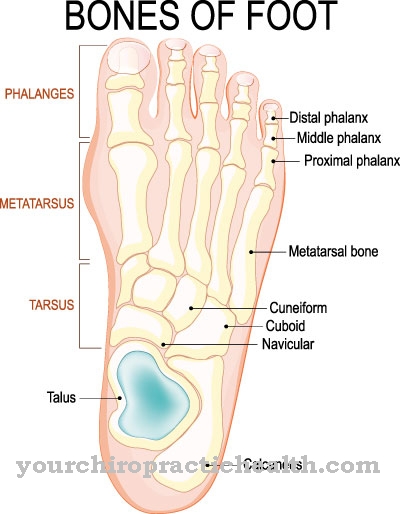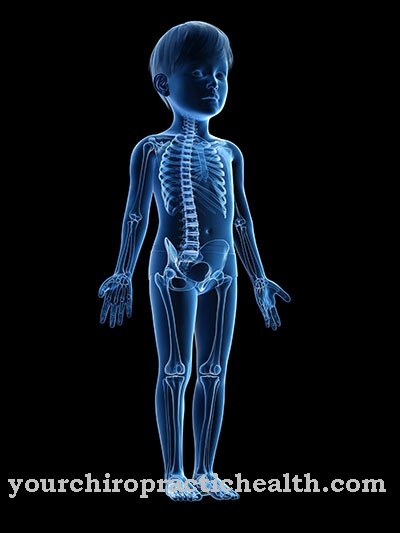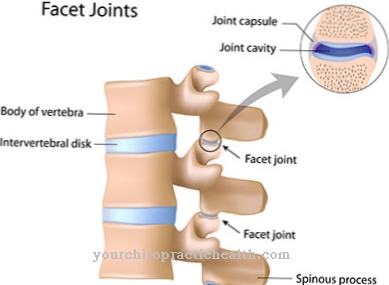The Three-month colic has become more and more a pseudo-term. If a baby often breaks out into persistent crying in the evening during the first three months, the doctor is better off adding "primarily excessive crying" or "persistent evening crying". It is still not clear whether the cause is really colic.
What are three-month colic?

© S.Kobold - stock.adobe.com
Three-month colic is a condition after birth in which a baby cries for more than three hours in a row. This condition is repeated at least four times a week and for at least three weeks in a row. This excessive writing does not have to stop after three months. It is not a time limit. There are no scientifically established causes for this condition.
Three-month colic affects around 15 percent of babies in the first few months after their birth. This condition usually begins in the second week of life. The infants cry in the late afternoon, evening, or night after a meal. It is then very difficult to calm them down. The stomach is bloated. These symptoms will go away on their own after a few hours.
Because the apparent cause of excessive crying is gas or colic, this condition is often called three-month colic.
causes
The causes of three-month colic are not known. However, a number of factors are discussed. This includes an adjustment disorder of the bowel. The digestive system in babies is not yet fully developed. As a result, some newborns have trouble getting used to substitute food. The baby might not tolerate certain foods, for example cow's milk allergy.
It may not be able to coordinate the swallowing process properly yet. The excessive screaming may be a response to the parents' tension and nervousness. Some parents do not yet know how to best deal with the child. It might actually have gas. Or the child is still suffering from a birth trauma due to difficulties in pregnancy.
Professional support helps - especially with the first baby. Some parents wait too long before seeing a doctor or therapist. The child's complaints must be clarified using a differential diagnosis. The parents themselves also need help, advice or support.
Symptoms, ailments & signs
- Excessive crying in infancy
- Flatulence, possibly bloated stomach
- stomach pain
- Red face
Diagnosis & course
The three-month colic is characterized by a certain temporal rhythm of screaming. The infants are newborns or up to three months old. The occurrence of excessive screaming
- lasts for at least three hours,
- occurs at least four days a week and
- has been going on for more than three weeks.
The intussusception and volvulus must be excluded from the differential diagnosis. Intussusception is the invagination of one section of the intestine into another. The children have colicky pains, are pale and apathetic. The stool turns into bloody phlegm. The volvulus is a special form of the mechanical ileus. It only occurs in the first months of life and in the first years of school.
The intestine has rotated on its own axis. The children have stomach pains and vomit. Children diagnosed with intussusception or volvulus are immediately admitted to the nearest children's hospital for an operation. If the symptoms of three-month colic persist for several months, a cow's milk allergy is suspected.
Complications
Three-month colic can lead to various complications. First and foremost, the baby cries very loudly, which can be attributed to the pain caused by the flatulence. The child often experiences pain in the abdomen and face reddening. The pain in the abdomen often leads to vomiting or diarrhea.
The three-month colic often also has a negative effect on the psyche of the parents, as they suffer from sleep disorders and lack of sleep. An aggressive attitude can also develop, which is strengthened by depression. Targeted treatment can primarily be carried out by the parents themselves by calming the child down.
There can be no further compilations. If the three-month colic occurs after breastfeeding, a strict diet can be prescribed to avoid possible allergies or intolerance. Often, milk powder can also be used for breastfeeding. The three-month colic usually does not lead to any further complications or complaints and will go away on its own. For the parents, they can be a very uncomfortable and stressful time as the child will not stop screaming.
When should you go to the doctor?
If the three-month colic persists for more than three months or causes unusual symptoms, a visit to the pediatrician is recommended. If the child suffers from extreme diarrhea or vomiting, for example, this must be clarified. Medical advice is required at the latest when symptoms of dehydration or malnutrition appear, such as dry mucous membranes or apathetic behavior. The same applies if the child shows signs of lack of sleep or stress. Then the doctor can prescribe mild sedatives and alleviate the symptoms in a targeted manner.
It is advisable to speak to the pediatrician responsible before the onset of three-month colic in order to be prepared for the disease. As the three-month colic is also a burden for the parents, therapeutic help may be indicated. Especially with the first child, it is advisable to work through the difficult phase in conversation with a therapist and possibly even to seek support in raising children. If there are major complications such as severe diarrhea or vomiting, the emergency doctor must be called immediately.
Doctors & therapists in your area
Treatment & Therapy
There is no medical therapy for three-month colic. The symptoms will go away on their own. The parents can have a calming effect on the child. The physical proximity to the caregiver helps. Further, gentle external stimuli such as whispering or constant rhythms such as when walking can be used as a distraction. Babies like to be carried around and given attention. Some children just want to be breastfed more often.
Some doctors still give some recommendations: All foods that contain additives should be left out. If the mother is breastfeeding, her diet has top priority. She should make a plan of how often and exactly what to eat and when. If the mother craves something sweet herself, then fruit or some glucose are the better alternative to sweets. The mother shouldn't drink cow's milk herself either. She could try goat milk or go without milk for a while.
Egg and soy can also cause allergies. If the mother loses weight while breastfeeding, pollutants stored in the adipose tissue are dissolved and these are then passed on to the infant via the breast milk. If the child is not breastfed, the following considerations can be useful: The instructions on the milk powder explain exactly how the milk is prepared. After preparation, the bottle must stand for another 10-15 minutes so that the air can settle out of the mixture. The foam head must not be administered.
A change of brand or manufacturer may also help. The milk can be mixed with caraway tea. In some cases, a defoamer can also help.
Outlook & forecast
Three-month colic is usually harmless. The acute phase of the illness is a great strain for the child and the parents, but after three months the symptoms subside by themselves. Consequential damage is not to be expected and the child develops quite normally after the three-month clinic has subsided.
In individual cases, the illness can cause psychological problems in the parents. Due to the lack of sleep and the constant stress associated with recurring colic, depressive moods, personality changes or fears set in. Existing mental illnesses can intensify.
However, the three-month colic itself usually does not lead to long-term health problems. The prognosis is accordingly positive. If the disease is recognized and treated early, it often subsides before the three months and is less stressful for the child and the parents as it progresses. However, diarrhea can cause a lack of fluids and nutrients, which can lead to dehydration. If the symptoms of dehydration are dealt with quickly, the prospect of recovery is good.
prevention
The basic requirements for a happy baby are good relationships with caregivers and rest to sleep. A baby needs breast milk until its own digestive system has developed for other foods.
Otherwise, all factors that can provoke allergic processes in the baby must be turned off. Babies are also happy to have a bottle of tea, for example sage tea, chamomile tea or caraway tea. After the meal, the air should first escape from the stomach before the child is put to sleep.
Aftercare
The measures or options for follow-up care are relatively limited in most cases in the case of three-month colic. First and foremost, those affected depend on an early diagnosis in order to identify and treat the cause of the three-month colic. The earlier a doctor is consulted, the better the further course of this disease is usually.
For this reason, early detection of this disease is paramount. In most cases, the treatment itself is carried out by the parents or by the relatives themselves, although they are usually trained by a doctor to alleviate the symptoms of three-month colic. However, if the measures are unsuccessful, a doctor must be consulted again in any case.
In many cases, the parents have to rely on the use of powdered milk if the child cannot ingest the breast milk. It is important to ensure that the preparation is correct. In some cases, tea can also be used to dilute the milk. However, regular examinations should also be carried out by a doctor to monitor the child's body. The life expectancy of the child is usually not reduced by this disease.
You can do that yourself
If a baby suffers from three-month colic, care should be taken when feeding that it does not drink too quickly. An upright sitting position can also help to prevent air swallowing, and it also makes it easier to burp regularly during and after meals. When feeding with the bottle, too large a teat hole or foam formation can lead to increased swallowing of air and thus to flatulence.
Flatulence in some foods can be passed on to the baby in breast milk and trigger colic: Breastfeeding mothers should therefore avoid consuming cabbage, onions and leeks. Individual other foods can also cause discomfort in the infant; this may have to be found out through an exclusion diet.
A calm environment and a regular daily routine have a positive effect on the baby's well-being and can encourage sleep. Sometimes moving around, swinging in the baby carrier or going for a ride in the stroller is also helpful; soft music or a steady source of noise can also help calm the baby.
In the case of acute colic, a gentle stomach massage with caraway oil can provide relief, and the application of heat has a relaxing effect. Since three-month colic is also a great burden for parents, they should not be afraid to accept help from relatives or friends and occasionally allow themselves a break.


.jpg)










.jpg)

.jpg)
.jpg)











.jpg)